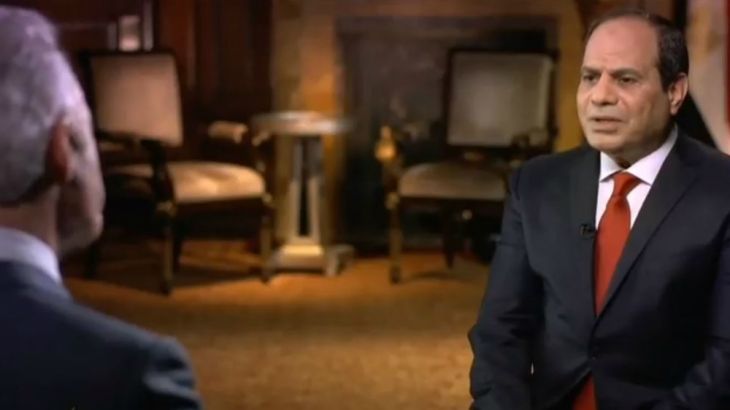CBS broadcasts Sisi interview despite Egypt request not to air it
In ’60 Minutes’ show, president denies rights abuses and acknowledges Sinai military cooperation engagement with Israel.

US network CBS has broadcast an interview with Egypt’s President Abdel Fattah el-Sisi despite a request by the Egyptian government not to air the programme.
During the station’s “60 Minutes” investigative news show, el-Sisi told host Scott Pelly that his country was engaged in military cooperation with Israel in Sinai and denied the detention of political prisoners in Egypt.
Keep reading
list of 4 itemsTurkey and Egypt call for ceasefire in Gaza
Turkey’s Erdogan, Egypt’s Sisi meet in Cairo
Turkey’s Erdogan arrives in Egypt for first visit in more than a decade
Before the airing of the interview on Sunday, CBS had said the information given by el-Sisi was “not the kind of news his government wanted broadcast”.
“The 60 Minutes team was contacted by the Egyptian ambassador shortly after and told the interview could not be aired,” the network said, without specifying which part of the president’s comments Cairo objected to.
Under Sisi, Egypt has quietly cooperated with Israel on security in Egypt’s Sinai, a desert peninsula demilitarised as part of a US-sponsored 1979 peace treaty between the two countries but where Cairo’s forces now operate freely.
Acknowledging such cooperation with Israel can be a sensitive and potentially damaging topic in Egypt.
Asked whether the cooperation was the closest and deepest that he has had with Israel, Sisi responded: “That is correct. The Air Force sometimes needs to cross to the Israeli side. And that’s why we have a wide range of coordination with the Israelis.”
Egypt’s military last year denied media reports that it was cooperating with Israel against fighters in northern Sinai, now led by the Islamic State of Iraq and the Levant (ISIL, also known as ISIS) group.
Asked why he had not managed to wipe “the estimated 1,000 terrorists” out after receiving $1bn in annual US military aid, el-Sisi responded by pointing to the challenges that Washington has faced in Afghanistan against the Taliban.
“Why hasn’t the US eliminated the terrorists in Afghanistan after 17 years and spending a trillion dollars?” he asked.
Rabaa killings
El-Sisi was also asked about the massacre of more than 800 Muslim Brotherhood supporters in Rabaa al-Adawiya Square in 2013 when he was defence minister, and whether he gave that order?
“Allow me to ask you a question,” el-Sisi told Pelly who had asked him whether he had given the order. “Are you closely following the situation in Egypt? From where do you get your information? There were thousands of armed people in the sit-in for more than 40 days. We tried every peaceful means to disperse them,” el-Sisi said.
|
|
Pelly then asked whether the response by security forces was “necessary” to the peace and stability of Egypt, citing a Human Rights Watch report on Rabaa which said that “using armored personnel carriers, bulldozers, ground forces and snipers, police and army personnel attacked the protest encampment with hundreds killed by bullets to their heads, necks and chests.”
In response, el-Sisi denied that the HRW was a “sound statement”.
“There were police personnel and they were trying to open peaceful corridors for the people to go safely to their homes.”
El-Sisi also dismissed reports from international rights organisations estimating that Egypt has imprisoned as many as 60,000 political activists
“I don’t know where they got that figure. I said there are no political prisoners in Egypt,” el-Sisi said, his face shiny with sweat. “Whenever there is a minority trying to impose their extremist ideology … we have to intervene regardless of their numbers.”
Al Jazeera journalist Mahmoud Hussein was arrested in December 2016 as he returned home to visit his family. Hussein has been held in an Egyptian prison without charge for 745 days.
The detentions are part of a large crackdown on dissent that includes tight control of the media, placing draconian restrictions on rights groups and reversing most of the freedoms gained by a 2011 uprising against autocrat Hosni Mubarak.
‘Uncomfortable, sweating’
Khaled Elgindy, non-resident fellow at the Center for Middle East Policy at the Brookings Institution, said that “the optics were not good” for el-Sisi during his 60 Minutes interview.
“He came across as uncomfortable, sweating and also, of course, his responses – just completely denying everything that has been documented … by so many human rights groups both in Egypt and outside Egypt,” Elgindy told Al Jazeera.
|
|
“There was no nuance at all to his responses, they were simply very absolute and sweeping, ‘there are absolutely no political prisoners’, which is simply not believable.”
Elgindy said it was “striking” that el-Sisi – who is not known for giving many TV interviews – had agreed to speak to 60 Minutes and “surprising” how Egyptian officials went and asked CBS not to air the programme.
Commenting on the Egyptian president’s decision to appear in the show, Elgindy said that el-Sisi “to a certain extent … feels a little bit more emboldened” with Donald Trump at the White House.
“He probably felt that having a friendly administration in power in Washington was a good opportunity to try and reach out to at least President Trump’s base – that may be part of his thinking that he can win over some segment of the American public that would support him and his narrative as well as that of President Trump, but I don’t think it will go over well with the American public at large,” Elgindy said.
El-Sisi won a second, four-year term in office last year after running virtually unopposed.